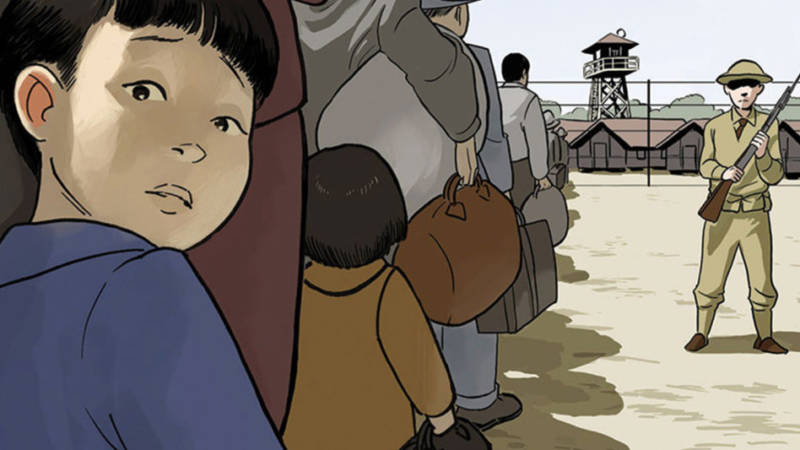Becker also helps dramatize the contrast between George’s and his parents’ experiences of their ordeal. It’s spring of 1942 when Takei’s family is first taken from their Los Angeles home. Allowed to keep only what they can carry, Takei’s parents must sell off their belongings for next to nothing. At one point they’re forced to sleep in horses’ stalls, but George views this as an adventure: “We get to sleep where the horses slept! Fun!” For his parents, of course, it’s no such thing. “It was a devastating blow,” Takei writes. “They had worked so hard to buy a two-bedroom house and raise a family… Now we were crammed into a single, smelly horse stall.”

That’s the first of numerous occasions when young George’s innocence protects him. When everyone is forced to wear tags — “to keep track of us, like cattle” — he thinks it’s just another train ticket. “I saw people crying and couldn’t understand why,” he remembers. At one camp, another boy tells him the barbed wire is there to keep dinosaurs out. For Takei’s parents, meanwhile, it’s a constant struggle to maintain a sense of order and humanity. Takei’s father helps other families settle in and serves as a translator and mediator, while Takei’s mother sews clothes and makes curtains and rugs.
The family’s ordeal doesn’t end in the camps. Once the Takeis are allowed to return to Los Angeles in 1945, they have to live on the street. Enrolled in public school, George endures discrimination from a racist teacher and begins to feel the shame his parents felt. “I was old enough by then to understand that camp was something like jail, but could not fully grasp what we had done to be sent there,” he remembers. As he grows up and becomes an actor, he fights a two-pronged battle: to overcome shame and to reconcile his experiences with America’s stated ideals.
It’s a struggle that can probably only be fully understood by a survivor of internment — and probably not by politicians seeking exculpation for acts of bureaucratic evil. But Takei hopes some of those politicians will try. He concludes They Called Us Enemy with a critique of our current government’s policies treating certain people as “Enemy.”
Takei closes with a quote from President Obama saying, in part, that “history … must be a manual for how to avoid repeating the mistakes of the past.” It may be too late to undo what was done to Japanese Americans almost 70 years ago, but Takei suggests it’s not too late to learn from it.

Copyright NPR 2019.
Etelka Lehoczky has written about books for The Atlantic, The Los Angeles Review of Books and The New York Times. She tweets at @EtelkaL.




